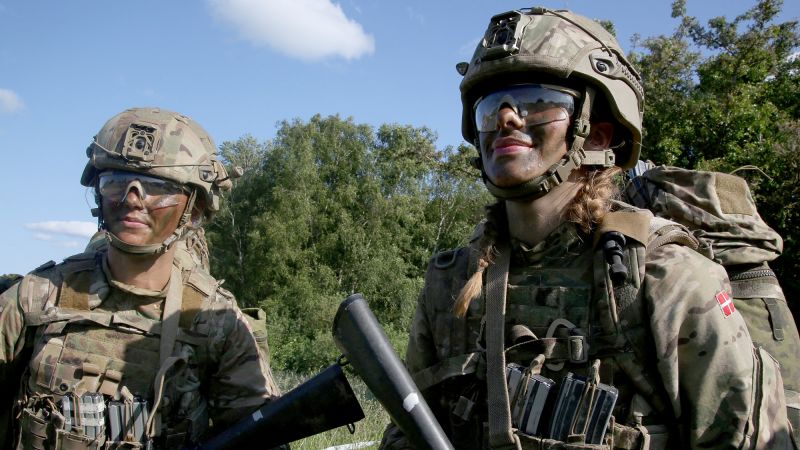Denmark has announced a significant shift in its military conscription policy, now requiring women to register for potential military service. This move, unveiled on Tuesday, aims to bolster the country’s defense capabilities in light of escalating security challenges across Europe. The legislation, passed by Denmark’s parliament in June 2023, mandates that women turning 18 after July 1, 2025, participate in assessment days for possible conscription, aligning their obligations with those of their male counterparts.
Historically, Danish women have had the option to join the military voluntarily, contributing to about 24% of recruits last year. However, this new law marks a departure from voluntary service to mandatory registration, reflecting a broader strategy to enhance military readiness. “In the world situation we’re in right now, it’s necessary to have more conscripts, and I think that women should contribute to that equally, as men do,” stated Katrine, a recruit in the Danish Royal Life Guard, in an interview with Reuters.
Adjustments for Inclusivity
The Danish armed forces are proactively adapting to this policy change by modifying barracks and equipment to better accommodate female recruits. “There are different things that they need to improve, especially in terms of equipment. Right now, it’s made for men, so perhaps the rucksacks are a bit too large and the uniforms are large as well,” Katrine noted, highlighting the logistical challenges that come with integrating women more fully into the military framework.
This development follows a broader commitment by Denmark and its NATO allies to enhance defense spending. As part of this commitment, Denmark plans to increase the duration of conscription from the current four months to 11 months by 2026 and aims to expand the number of recruits from approximately 5,000 to 7,500 by 2033.
Historical Context and Global Trends
Denmark’s decision to include women in mandatory military service is not without precedent. Several countries, including Norway and Israel, have long-standing policies requiring women to serve in their armed forces. This shift reflects a growing recognition of the need for gender equality in military service and the strategic advantages of a more inclusive armed force.
According to defense analysts, the inclusion of women in conscription could enhance operational effectiveness by diversifying the skill sets and perspectives within military ranks. “The integration of women into compulsory military service is a logical step towards a more balanced and capable defense force,” said Dr. Lars Jensen, a military strategist at the Danish Institute for International Studies.
Implications for Denmark and Beyond
The move represents a significant cultural shift in Denmark, where military service has traditionally been a male-dominated domain. By mandating female participation, Denmark not only strengthens its military capacity but also sets a precedent for gender equality in national defense. This policy could influence other nations considering similar measures, particularly in regions facing heightened security threats.
Meanwhile, the Danish government is expected to continue its efforts to ensure that military environments are conducive to the needs of all recruits. This includes ongoing evaluations of equipment and facilities to support a gender-diverse military force.
As Denmark prepares for the implementation of this policy, the focus will likely remain on balancing the demands of national security with the principles of equality and inclusion. The coming years will be crucial in assessing the impact of these changes on Denmark’s military effectiveness and societal perceptions of gender roles in defense.
The announcement comes as part of a broader strategy to adapt to the evolving security landscape in Europe. With increased tensions and the need for robust defense mechanisms, Denmark’s inclusive conscription policy could serve as a model for other nations seeking to enhance their military readiness while promoting gender equality.
About The Author
 Binance Coin Faces Volatility: Will BNB Reach $1,000?
Binance Coin Faces Volatility: Will BNB Reach $1,000? Indiana Fever Triumph in WNBA Commissioner’s Cup Despite Caitlin Clark’s Absence
Indiana Fever Triumph in WNBA Commissioner’s Cup Despite Caitlin Clark’s Absence CIOs Embrace Role as Change Agents in Modern Business Landscape
CIOs Embrace Role as Change Agents in Modern Business Landscape Focal Bathys MG: A Luxurious Leap in Wireless Audio Technology
Focal Bathys MG: A Luxurious Leap in Wireless Audio Technology North Korea to Bolster Russia’s Military with Up to 30,000 Troops, Reports Say
North Korea to Bolster Russia’s Military with Up to 30,000 Troops, Reports Say